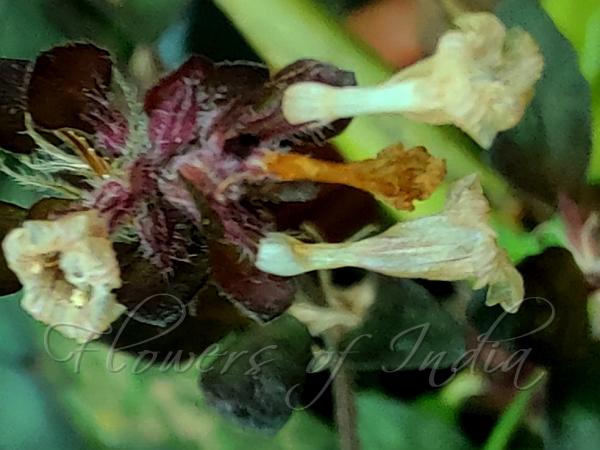|
| Creeping Coneflower |
|

|

| File size | 168192 |
| Original date | 7/20/24 4:07 PM |
| Resolution | x |
| Flash | Flash did not fire, auto |
| Focal length | 3.5mm |
| Exposure time | 1/100s |
| Aperture | 2.2 |
| Focus Distance | |
| Metering Mode | $meteringMode |
| Camera make | OnePlus |
| Camera model | OnePlus 9 5G |
| Sensor type |
|
|
|
|
Photo: |
Botanical name: Strobilanthes reptans Family: Acanthaceae (Acanthus family)
Synonyms: Ruellia reptans, Hemigraphis reptans, Hemigraphis diffusa
Synonyms: Ruellia reptans, Hemigraphis reptans, Hemigraphis diffusa
Creeping Coneflower is a herb up to 50 cm tall,
isophyllous. Flowers are borne in branch-end spikes, elongating to 6-8
cm at maturity. Flowers are white or pale violet with darker veins,
1.3-1.5 cm, hairless; tube basally cylindric for 4-6 mm; petals round,
2-5 mm, hairless. Stamens are 4, not protruding. Sepal-cup is 6.5-10
mm, 5-lobed to base; sepals linear-lanceshaped, fringed with hairs, tip
finely narrowed. Bracts inverted-lanceshaped to elliptic, 8-12 x 2-5
mm, bracteoles absent. Stems are sometimes rosette-forming but usually
prostrate and rooting at nodes. Leaf-stalk is 0.5-8 cm, velvet-hairy,
becoming hairless; leaf blade oblong, elliptic, oblong-ovate, or nearly
round, 1.5-8 x 1-4 cm, both surfaces velvet-hairy, secondary veins 4 or
5 on each side of midvein, base abruptly flat to slightly heart-shaped,
margin rounded toothed to almost entire, tip pointed to blunt. Capsules
are 7-9 mm, at tip velvet-hairy, 8-16-seeded. Creeping Coneflower is
native to Malesia and W. Pacific, naturalized in SE Asia, NE and South
India. Flowering: April-September.
| Identification credit: Preetha P.S. | Photographed in Kollam & Thiruvananthapuram, Kerala. |
• Is this flower misidentified? If yes,